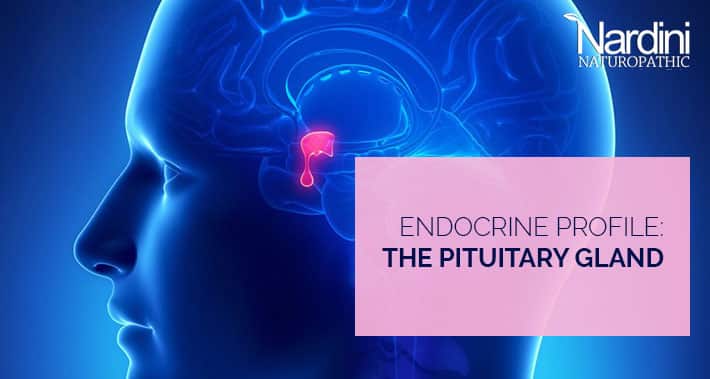If you’re reading this, you’re probably a pretty health-conscious person.
You’re likely doing all of the “right” things to maintain your health – exercise, eating a clean diet, getting enough sleep.
However, even if you’re taking all of these steps, if there is an issue with your endocrine system that’s undiagnosed, you might still end up not always feeling your best.
I’m Dr. Pat Nardini, a naturopathic doctor in Toronto, and I want to help you understand how the health of your endocrine system plays a role in your overall health.
Today we’ll take a closer look at the pituitary gland: what it does, conditions that affect it, and symptoms to watch for.
If you’re having issues related to pituitary gland health, or the endocrine system overall, I can offer natural endocrine health solutions to help you heal and get back to feeling your best.
What Is A Gland?
A gland is a type of organ in your body that secretes a particular type of substance, either to use in your body or outside of it.
There are two types of glands in your body – endocrine glands and exocrine glands.
Exocrine glands release substances such as sweat and saliva, while endocrine glands release hormones directly into the bloodstream.
The pituitary gland is part of the endocrine system.
What Is Your Endocrine System?
The endocrine system makes hormones which control a broad swath of functions, including, among other things, metabolism, sexual function, growth, sleep, and mood.
In addition to the pituitary gland, the endocrine system includes the thyroid gland, parathyroid glands, adrenal glands, pancreas, and sex organs.
What Is Your Pituitary Gland?
Sometimes called “the master gland,” the hormones produced by the pituitary gland control all of the other glands of the endocrine system.
The pituitary gland itself is controlled by the hypothalamus which regulates the release of hormones.
There are two lobes of the pituitary gland, each of which controls different hormones.
1. The Anterior Lobe
The anterior lobe releases the following types of hormones:
● Thyroid-stimulating hormone
● Growth hormone
● Beta-melanocyte-stimulating hormone (controls skin pigmentation)
● Endorphins and Enkephalins
● Prolactin
● Adrenocorticotropic hormone (stimulates adrenal glands to produce cortisol)
● Follicle-stimulating hormone
● Luteinizing hormone
2. The Posterior Lobe
The posterior lobe of the pituitary gland secrets two types of hormones, vasopressin and oxytocin.
Vasopressin prevents dehydration by helping your body conserve water, and oxytocin stimulates uterine contraction during labour, as well as the release of breast milk.
Conditions That Can Affect Your Pituitary Gland
There are a number of medical conditions which can affect your pituitary gland.
Let’s have a closer look at some of these.
1. Hypopituitarism
Hypopituitarismis a condition in which the pituitary gland doesn’t produce enough hormones – or produces none at all.
Typically, this condition affects reproductive function and/or growth.
2. Acromegaly
Generally associated with pituitary tumors, acromegaly occurs when too much growth hormone is produced.
A common symptom of this is enlarged hands and feet.
3. Cushing’s Disease
Cushing’s disease results in an excess of adrenocorticotropic hormone.
Symptoms include weight gain, hypertension, weakness, and bruising easily.
The cause is usually a tumor on or near the pituitary gland.
4. Pituitary Tumor
Most tumors on the pituitary gland are benign; however, they can affect the secretion of hormones.
These tumors can also result in headaches and vision problems.
5. Traumatic Brain Injury
A traumatic head injury can result in damage to your brain and the pituitary gland.
Symptoms may include behavioural changes, memory issues, and communication difficulties.
Symptoms Of A Problem With Your Pituitary Gland
Some of the symptoms to watch for which may indicate a condition related to the pituitary gland include:
● Fatigue
● Hypertension
● Weakness
● Headaches
● Weight gain which can’t be accounted for by a change in diet or exercise habits
● Problems with memory
● Depressive episodes and mood swings
● Trouble falling or staying asleep
● Infertility, irregular periods, erectile dysfunction, and other reproductive issues
● Unusual hair growth
● Lactation when not breastfeeding
How Your Pituitary Gland Can Affect Other Endocrine Glands
Because the pituitary gland releases hormones which control the other glands of the endocrine system, issues with the pituitary gland often impact the other glands in the system.
For instance, adrenocorticotropic hormone stimulates the adrenal glands to produce cortisol.
High levels of cortisol can lead to high blood pressure and weight gain.
Too much or too little thyroid-stimulating hormone, conversely,can lead to hyperthyroidism or hypothyroidism, respectively.
Nutrition For A Healthy Pituitary Gland
Most people realize that being mindful of your diet is, overall, a good idea.
There are, however, specific nutrients which the pituitary gland relies on to function at its peak.
Certain minerals, especially manganese and magnesium, as well as foods rich in vitamin E are specifically important for pituitary gland function.
Adding leafy greens, wheat germ, legumes, and nuts to your diet can help you to meet these requirements.
Iodine and iron also play important roles in pituitary gland function.
Low iodine can result in not enough thyroid hormone, leading to the overproduction of thyroid-stimulating hormone.
Iron, on the other hand, is one to watch – too much of it can damage the pituitary gland.
Book An Appointment With Nardini Naturopathic
Are you worried that you might have an issue with your pituitary gland?
Have you been experiencing symptoms such as the ones listed here without an explanation for them?
I’m Dr. Pat Nardini, ND, a Toronto-based naturopathic doctor and I want to help.
I will do a naturopathic assessment to help determine the cause of your symptoms and offer you naturopathic solutions to help heal your body and get you feeling well again.
If you have questions about how naturopathic medicine can help you, I offer free 15-minute health clarity sessions to answer any questions you might have.
Contact Nardini Naturopathic today to book an appointment.
If you have questions about naturopathic medicine, or you’d like to take your first step into the world of naturopathy, contact us at Nardini Naturopathic, and let’s book an appointment.
Yours in health,
Dr. Pat Nardini, Naturopathic Doctor
320 Danforth Ave suite 206,
Toronto, ON, M4K 1N8
-https://g.page/NardiniNaturopathicDanforth
Dr. Pat Nardini, ND is a licensed doctor of naturopathic medicine in Toronto, Ontario. He offers science based natural health solutions with a special focus on thyroid conditions.


